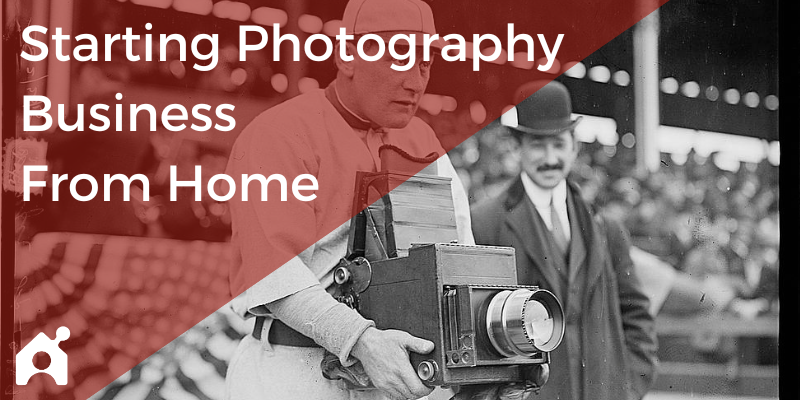How To Start A Photography Business From Home

Thanks to numerous technological advancements, working from home is no longer viewed as something unusual. Launching a business from the comfort of home is attractive to entrepreneurs of all stripes, but particularly in creative areas like photography, which relies more on your product and service than a physical location. The remote career path provides photographers with creative flexibility and a comfortable working environment according to their personal style and professional needs.
Starting a photography business from home eliminates the overhead costs of renting commercial space like a high-end studio. Still, there is plenty more to do and learn when setting up a business like this. Below, we’ll discuss the importance of understanding your market, what legalities you need to familiarize yourself with, and why you need to build an online presence. We’ll also talk about the need for quality gear and software.
Whether you’re interested in building a photography side hustle or want to grow your hobby into a full-time operation, this article is for you.
Building The Foundation Of Your Photography Business
Exploring the market you are entering, finding your niche, and taking care of legal paperwork are all crucial steps in building your home photography business.
Identify specific photography trends, genres, and styles — and figure out which ones you enjoy and/or are particularly good at. Find out whether the demand for your niche is high enough to sell your pictures at all. Can you handle the competition you’ll find in the photography market? What makes you stand out from other photographers working in the same genre?
Building your foundation will also include legal elements like registering your business name, determining your tax obligations, and obtaining necessary licenses or permits. These legal aspects will look different depending on what region you’re in, so do your own research and consult with a lawyer if necessary.
You should also draft a comprehensive business plan that covers goals, strategies, marketing, and potential financial issues.
Now, when considering how to start a photography business on the side, you may think that a business plan is not necessary; after all, photography will not be your main job. But running a successful side hustle requires good planning, time management skills, and a disciplined approach with properly settled boundaries. You want all those things so you don’t have to sacrifice the things most important to you to succeed in your side hustle.
Additionally, a comprehensive financial plan will show you where you need to spend money — and when to cut back. If you’re starting from scratch, you need to carefully plan your initial investments in quality photography gear. You’ll also want to invest in photo editing software to optimize your images, as well as marketing efforts to keep your business financially healthy.
Starting Your Home Photography Studio
Once you have a business strategy and understand your local market and your specific professional needs, it is time to bring your plans to life by setting up a photography studio at home. Finding a room for your equipment is a good place to start. The goal is to create a comfortable space for you and your potential subjects, encouraging the creative process.
Investing in the right equipment is key — your camera is your heart, your lenses are your eyes, and backdrops and props are the canvas on which you will create your art. Tripods ensure clarity and stability. Lighting tools allow you to experiment and also stand in when natural light is not on your side. Still, you should use natural light when possible.
Photo editing software is paramount for improving the quality of your images and simplifying your work, especially when it comes to complex editing tasks. When you work with multiple projects simultaneously and have strict deadlines, turn to advancements in technology and look for an AI photo editor for PC. Even if you are new to photography, this type of photo editor will help you get professional-grade shots without spending much time and effort.
Building Your Brand & Online Presence
In the digital era, a successful photography business is represented by a professional website, a stunning portfolio, and active use of social networks.
Your brand is your promise to your clients; it communicates your professionalism, style, and uniqueness in the crowded photography market. Crafting a compelling brand identity involves choosing the right name, logo, and the kind of messaging that resonates with your customers and reflects the essence of your work. This identity becomes the cornerstone of your marketing efforts, distinguishing you from competitors and building trust with potential clients.
Optimize your website so search engines can crawl and display it to those looking for photography services in your area. That website should contain a portfolio, which you should update frequently so potential customers can see your latest work.
Your website is important, but so is social media. Regularly posting high-quality images, behind-the-scenes content, and customer testimonials can create a buzz around your brand.
Additionally, you can also put the power of old-fashioned networking to work for you. Keep in touch with other local businesses, attend community events, and participate in online photography groups, exploring the opportunities it may bring.
Managing Your Business
Running a photography business isn’t just about taking beautiful and evocative pictures — it also requires handling various administrative tasks. You’ll need to schedule shoots, manage client communications, and conduct financial transactions, among other things.
A solid customer relationship management (CRM) system can organize client information, track project progress, and follow up on leads. Additionally, setting up a dedicated workspace within your home that is conducive to both the creative and administrative tasks of your business can help you maintain a balance between work and personal life.
Good Photos Are Only The Beginning
Success in photography hinges on your talent and creativity — but it’s also dependent on your ability to market yourself, manage your business effectively, and continually adapt to the changing industry.
In addition, building a distinctive brand, leveraging social media, and engaging with your community are crucial ways to reach potential clients and establish a long-term presence in the competitive world of photography. By understanding the landscape you operate in and designing your operation accordingly, you’ll be well on your way to running a successful photography business from home.
